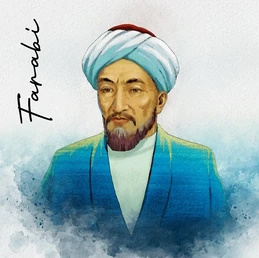"The Second Teacher - Al-Farabi
In the ancient city of Farab, where the scent of jasmine mingled with the echoes of bustling markets, there lived a sage whose intellect was as vast as the endless horizon stretching across the Central Asian steppes. His name was Al-Farabi, the Second Teacher, and his legacy would shape the course of Islamic philosophy for centuries to come.
Born in the bustling metropolis of Farab (in present-day Kazakhstan) around the 9th century CE, Al-Farabi's early years were steeped in the rich tapestry of Persian and Islamic culture. Raised in a devout Muslim household, he was deeply influenced by the teachings of the Quran and the Hadith, which instilled in him a profound reverence for the divine and a deep sense of spiritual devotion.
From a young age, Al-Farabi displayed an insatiable thirst for knowledge, devouring the ancient texts of Greek philosophy and Islamic theology with equal fervor. Guided by the wisdom of his tutors, he embarked on a journey that would take him from the dusty streets of Farab to the vibrant centers of learning in Baghdad and Damascus.
Along the way, Al-Farabi encountered a diverse array of scholars and thinkers, each offering their own unique insights into the nature of existence and the mysteries of the cosmos. Drawing upon the teachings of ancient Greek philosophers such as Aristotle and Plato, as well as Islamic theologians like Al-Kindi and Ibn Sina, he sought to reconcile the disparate strands of thought that wove through the fabric of Islamic civilization.
One of the greatest challenges Al-Farabi faced was the task of navigating the complex interplay between different intellectual traditions. In a world torn apart by sectarian strife and political upheaval, he sought to chart a middle path, drawing upon the wisdom of both the Greek and Islamic philosophical traditions.
Despite the challenges he faced, Al-Farabi's intellect blossomed like a desert flower after a summer rain. His mastery of logic, metaphysics, and political philosophy soon caught the attention of kings and scholars alike, earning him a reputation as one of the greatest minds of his time.
But Al-Farabi's journey was not without its trials and tribulations. As a devout Muslim living in a world where the boundaries between faith and reason were often blurred, he grappled with questions of theological doctrine and philosophical inquiry, seeking to reconcile the truths of revelation with the insights of human reason.
In his magnum opus, ""The Book of Letters,"" Al-Farabi sought to bridge the gap between the Arabic language and the universal principles of grammar and phonetics. In this seminal work, he laid bare the intricacies of language, revealing the hidden patterns and rhythms that underlie the spoken word.
But it was perhaps Al-Farabi's insights into the nature of music that truly set him apart as a philosopher. In his treatise ""The Meanings of the Intellect,"" he delved into the mystical and symbolic dimensions of music, positing that music had the power to transcend the boundaries of the material world and unite the soul with the divine.
As the years went by, Al-Farabi's fame spread far and wide, drawing students and scholars from distant lands to sit at his feet and drink from the wellspring of his wisdom. His treatises on logic, metaphysics, and political philosophy became indispensable tools for those who sought to navigate the complexities of the human condition.
Yet, for all his brilliance, Al-Farabi remained humble, ever mindful of the limits of human understanding. His legacy, however, would endure long after his passing, a beacon of light amidst the darkness of ignorance, a testament to the enduring power of knowledge and wisdom.
Influence and Legacy:
Al-Farabi's works would go on to influence generations of scholars, shaping the course of Islamic intellectual history for centuries to come. His synthesis of Greek philosophy with Islamic theology laid the groundwork for the development of Islamic philosophy, while his insights into music and metaphysics enriched the cultural and intellectual landscape of the Islamic world.
Yet, despite his monumental contributions, Al-Farabi's name would often be overshadowed by those of later luminaries. It was not until the Renaissance that Western scholars would come to recognize the debt owed to this sage of Farab, whose intellect had paved the way for the great intellectual flourishing of the Islamic Golden Age.
Today, as we ponder the mysteries of existence and the nature of the human soul, let us remember the Second Teacher whose legacy endures as a testament to the enduring power of knowledge and wisdom.
Notable Works:
1. ""The Book of Letters"" - A treatise on Arabic phonetics and grammar, exploring the structure and sound of the Arabic language.
2. ""The Meanings of the Intellect"" - A philosophical work on logic, metaphysics, and music, delving into the nature of existence and the essence of being.
3. ""The Philosophy of Plato and Aristotle"" - A comparative study of the philosophies of Plato and Aristotle, exploring their respective views on metaphysics, ethics, and politics.
Related Scholars:
Al-Farabi's legacy resonated with later Islamic philosophers and scientists, including Ibn Sina, Al-Kindi, and Averroes (Ibn Rushd), who built upon his ideas and expanded the horizons of human understanding.
"





Delete Comment
Are you sure that you want to delete this comment ?
Delete Comment
Are you sure that you want to delete this comment ?
TranquilTruths
Delete Comment
Are you sure that you want to delete this comment ?
Delete Comment
Are you sure that you want to delete this comment ?
Mohammad Khan
Delete Comment
Are you sure that you want to delete this comment ?
Allah'sAura
Delete Comment
Are you sure that you want to delete this comment ?
SacredKnowledge
Delete Comment
Are you sure that you want to delete this comment ?
Maryam Aziz
Delete Comment
Are you sure that you want to delete this comment ?
Salma Khanom
Delete Comment
Are you sure that you want to delete this comment ?
GuidanceFromQuran
Delete Comment
Are you sure that you want to delete this comment ?
Anika Ahmed
Delete Comment
Are you sure that you want to delete this comment ?
Nomcebo Ngcobo
Delete Comment
Are you sure that you want to delete this comment ?
BlessingTrails
Delete Comment
Are you sure that you want to delete this comment ?